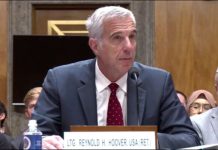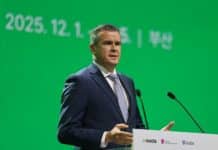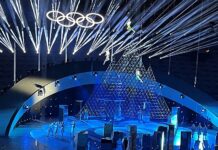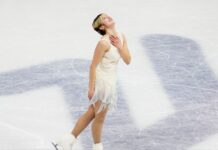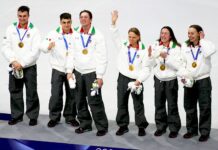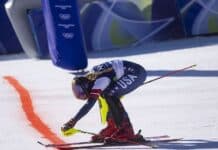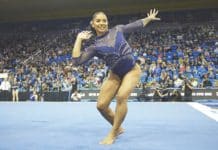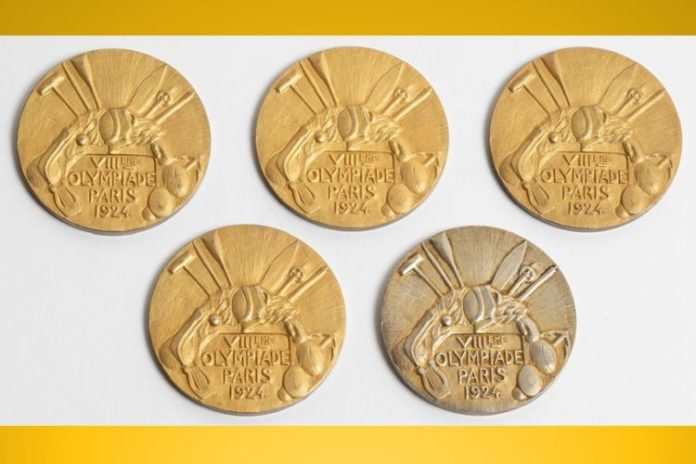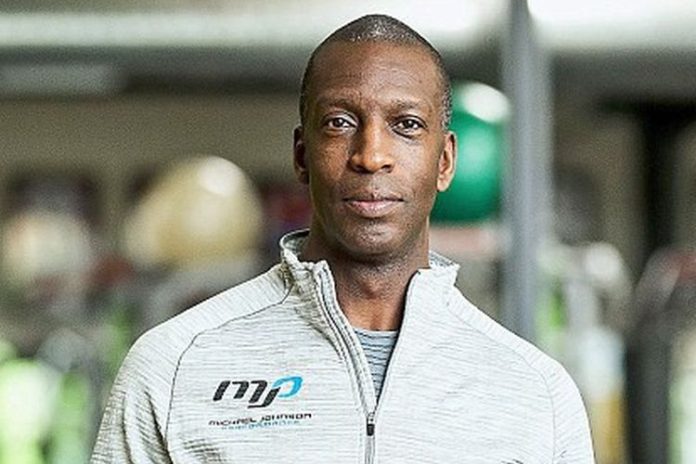★ The Sports Examiner: Chronicling the key competitive, economic and political forces shaping elite sport and the Olympic Movement.★
★ To get The Sports Examiner by e-mail: sign up here! ★
★ Getting there! Our 34 generous donors have now covered 60.7% of our winter technical and support costs. Can you help with the rest? Please consider a donation to help keep TSX going. Thank you. ★
≡ THE 5-RING CIRCUS ≡
1. Putin orders ROC to propose Paris participation rules
2. Russian news agency plays up Paris 2024 problems
3. Everybody files vs. everyone else in Beijing skating appeals
4. Guardian’s Ingle suggests field-event tournaments!
5. Italian daily on the Cortina track: IOC “washed its hands of it”
● Russian President Vladimir Putin directed his sports ministry and the Russian Olympic Committee to formulate regulations for possible Russian participation at Paris 2024, with an eerie echo of 1984.
● The government-owned Russian news agency TASS is also sounding a 1984 tone in its criticism of the Paris 2024 organizing committee, the Paris and French governments, and more. Will the Games even happen?
● Four appeals were filed with the Court of Arbitration for Sport in the never-ending tug-of-war over the 2022 Beijing Olympic figure skating Team Event, asking an arbitration panel to settle who gets what medals. Another delay.
● Amid the rhubarb going on over the World Athletics idea of testing a “take-off zone” for the long jump, British reporter Sean Ingle proposes a tournament-style format for horizontal jumping and throws finals!
● The International Olympic Committee has “washed its hands” of the Italian project to build a sliding venue for the 2026 Milan Cortina Winter Games, with the Rome daily Il Fatto Quotidiano offering perhaps the best, clearest summary of the matter. The final decision comes in March 2025.
● Panorama: Paris 2024 (Panam Sports announced 31-NOC training camp for 370 athletes in Alsace) = International Olympic Committee (IOC granted observer status for U.N. climate body) = FISU (Eder reflects on priorities) = Alpine Skiing (twice Olympic medalist Mowinckel to retire at season’s end) = Athletics (4: Nurmi’s five golds to be displayed in Paris; U.S. world-record-setter Jones out of World Indoors; Mateiko and Gebreselama grab 2024 Half Marathon leads; German Dehning, 19, throws spear 295-2!) = Basketball (U.S. splits first two men’s AmeriCup qualifiers vs. Cuba) = Boxing (IBA accepts new Czech federation) = Canoeing (ICF to get advice from Deloitte) = Cross Country Skiing (Schumacher and Diggins take 50 km wins at 50th American Berkebeiner) = Curling (Sochi Olympic champ skip Jones to retire) = Football (3: Mexican women shock U.S. in CONCACAF W Gold Cup; Canadian players ask C$40 million in suit vs. federation; FIFA starts pilot effort on FIFA Series development project) ●
● Errata: Olympic statman Hilary Evans (GBR) noted that new women vault leader Molly Caudery noted in Monday’s post is British, not French! Now corrected, with thanks! ●
1.
Putin orders ROC to propose Paris participation rules
On Sunday, Igor Levitin, Assistant to the President of the Russian Federation told a Moscow forum that Russian President Vladimir Putin has asked for recommendations on whether Russian athletes should compete – if allowed – at the Paris Olympic Games this summer:
“The President instructed the Ministry of Sports and the ROC to make proposals for the participation of our athletes in the Olympics in Paris.
“Since qualifying competitions are already underway, it is necessary to decide for each federation on what conditions they will participate in the Games and what declarations will be required for them with from international sports organizations so that we can make a decision on the participation of our athletes.”
Russian Sports Minister Oleg Matytsin repeated the common refrains which indicates that the Russian government will likely ban its athletes from competing in Paris:
● “One of the key objectives of sport is humanitarian. In this regard, the actions of the International Olympic Committee and some federations to restrict the access of our athletes look categorically unacceptable. This is a direct violation of the Olympic Charter. Requirements to sign declarations are unacceptable.”
● “The key will be respect for the interests of our athletes, coaches and compliance with the Olympic Charter. We have repeatedly said that the demands of some federations to sign a declaration are unacceptable for our athletes. We await the final decisions and recommendations of the IOC on the participation of our athletes. And we will make the appropriate decision together with the Russian Olympic Committee and the sports community.”
At the same conference, Russian Olympic Committee head Stanislav Pozdnyakov once again railed against the sanctions imposed since Russia’s invasion of Ukraine:
“All the steps and actions of our unfriendly opponents are largely aimed at breaking the existing system. When instead of a rich competitive process, a murderous vacuum is artificially created – athletes have nowhere to perform, spectators have nothing to watch.
“Spartakiades and World Friendship Games create new competitive opportunities for the leaders of national teams and for those who are replacing them.”
And Matytsin said that Russia has not only absorbed multiple sports organizations in the Ukrainian areas it is occupying – which led to the suspension of the Russian Olympic Committee by the IOC – but is now integrating them as fully Russian facilities:
“The Ministry of Sports is actively working to integrate new entities into the life of the country.
“Our task is to provide all the necessary conditions for this. 114 regional sports federations in the LPR [Luhansk], DPR [Donetsk], Kherson and Zaporozhye regions were registered at the end of 2023. Along with financial support, invaluable work on integration regions are carried out by the Our Sport Foundation, federations, and the Presidential Fund for Cultural Initiatives.
“Thanks to this, athletes are provided with equipment, 11 facilities have been restored, sports equipment has been supplied to 213 institutions, and 13 open-air playgrounds have been created.”
Observed: All of this parallels the rhetorical structure that led to the Soviet boycott of the 1984 Los Angeles Games. There, Russia’s 1980 Moscow Games was degraded by a U.S.-led boycott over the invasion of Afghanistan and the Soviet Politburo decided to stay away from Los Angeles for spite.
Now, with the Russian invasion of Ukraine and the Olympic Games in a NATO-member country – France – the Russian line is that it has done nothing that should keep it out of international sport and that it is the aggrieved party. So why should it be humiliated by having to send only a few athletes to Paris?
This position plays well in domestic politics and new competitions have been set up to showcase Russian athletes in the BRICS Games in June in Kazan and the World Friendship Games in Moscow, Yekaterinburg and possibly Minsk in September, where they will trounce the competition and declare victory.
Moreover, by keeping its athletes at home, Putin can try to embarrass the IOC and President Thomas Bach (GER), who has insisted that Russian and Belarusian “neutral” athletes should be able to compete in Paris. This aspect could be linked to a lobbying effort by Russia through the BRICS countries and especially IOC friends in Africa and Asia to influence the IOC’s forthcoming presidential election in 2025 … and could even convince Bach to stay on, despite criticism from the West over breaking the Olympic Charter term limits he helped institute.
Keep in mind, the final deadline for entries is not until 8 July, although the federations will require earlier declarations in order to re-assign places not taken. This could take a while.
2.
Russian news agency plays up Paris 2024 problems
Taking another page from the Soviet media playbook, the Russian news agency TASS – owned by the Russian government – is presenting the 2024 Paris Olympic Games as a problem continuing to spiral to a dismal end.
A Monday post was headlined “‘There are doubts that it will take place.’ The main problems of the Olympics in Paris” and began:
“Preparations for the Summer Olympics in Paris are constantly accompanied by scandals and problems, which the organizers of the competition and the French authorities have exactly five months to eliminate – the opening ceremony of the Games will take place on July 26.
“‘Judging by what is happening there, I have great doubts that the Olympics will take place at all,’ Elena Vyalbe, a member of the executive committee of the Russian Olympic Committee and head of the Russian Cross-Country Federation, said last week.”
The story goes on to offer a list of issues:
● Safety: “International security think tank Dragonfly said the terrorist threat ‘remains high’ during the Games” and “Paris, home to almost 2 million Muslims, regularly becomes the center of anti-Israeli demonstrations, which often end in clashes with police.”
● Public opinion and transport: “Parisians for the most part are no longer particularly happy that their city will host the Olympic Games. According to surveys, half of residents plan to leave the city during the competition, and three-quarters are concerned about safety and transport issues.”
Also:
“The mayor of the capital, Anne Hildago, admitted that the relevant infrastructure in Paris will not be ready for the Games. And the former transport minister Clément Beaune, who is in public conflict with the mayor, warns Parisians that difficult times await them.”
● Corruption: “In 2018, shortly after the victory of the Paris bid, it was planned to spend $6.8 billion on the Olympics. Now this figure has already exceeded $8 billion, of which the expenses of the organizing committee are $4.4 billion. The budget growth was influenced by several factors, among which the main one is inflation, largely provoked by anti-Russian sanctions.”
● Climate and unsanitary conditions: “Paris has never been known for its cleanliness, as evidenced by the invasion of bedbugs last year. The scale of the disaster was so great that its impact on the Olympics was seriously discussed.
“But much more pressing for the Games is the problem of water quality in the Seine, since the river will host the 10 km swimming competition. The situation is so serious that last year Paris was unable to host test events, including triathlons. In particular, the concentration of E. coli exceeded the maximum permissible level in all samples.”
All of this is straight out of the Soviet playbook: the enemy is dirty, cheating, lying and anti-Russian. Never mind the invasion of Ukraine.
In the lead-up to the 1984 Olympic Games in Los Angeles, the same issues were raised about an Olympic Games in the U.S., especially after the U.S.-led boycott of Moscow 1980. And it served as a prelude to the final decision of the Soviet Politburo to boycott the 1984 Games, announced on 8 May 1984.
Will Russia wait that long to make its announcement on 2024?
3.
Everybody files against everyone else in Beijing skating appeals
The Court of Arbitration for Sport registered four appeals in the continuing drama over the Beijing 2022 Olympic Winter Games figure skating Team Event.
Monday’s announcement explained the four separate actions, likely to be combined as a single proceeding, include:
● The Canadian Olympic Committee, Skate Canada and the eight Canadian skaters in the Team Event vs. the International Olympic Committee, International Skating Union, the Figure Skating Federation of Russian, and six members of the Russian Team Event squad.
This appeal asks for Canada to be awarded the bronze medal instead of Russia, and to compel the IOC to award the Team Event medals to the U.S. (gold), Japan (silver) and Canada (bronze).
● Russian Olympic Committee vs. International Skating Union
● Figure Skating Federation of Russia vs. International Skating Union
● Aleksandr Galliamov, Nikita Katsalapov, Mark Kondratiuk, Anastasia Mishina, Victoria Sinitsina and Kamila Valieva vs. International Skating Union
These all ask that the Court of Arbitration for Sport order the ISU to maintain the original outcome of the Team Event – Russia first. U.S. second and Japan third – irrespective of the decision that Russian skater Valieva was guilty of doping.
The Court of Arbitration statement noted, “All four CAS arbitration procedures have just commenced. Given the early stage of the proceedings, no indication can be given as to when a hearing may take place, if any.”
Observed: These appeals will further delay the ultimate outcome of the Beijing 2022 Team Event, now past two years. It will also likely slow down the plans of the IOC and the U.S. Olympic & Paralympic Committee to award the gold medals to the U.S. team members. USOPC chief executive Sarah Hirshland indicated that planning had already started on this, but now will probably be delayed awaiting a decision on these appeals.
The Russian appeals are unlikely to go far, but were certain when the CAS decision in the Valieva case explicitly stated that it was limited to the question of whether Valieva was guilty of a doping offense and should be sanctioned (yes, and for four years). Now it will have to deal with the results questions from both the Canadian and Russian side.
The ISU left itself open to appeal from Canada when it decided not to apply its Anti-Doping Rule 11.2.2 and its Rule 353 (4) on how to treat doping violations and disqualifications of competitors (and the resulting team scoring impact).
The Russian appeals have no chance of success other than on procedural grounds, but are a show of domestic support for its skaters. It is possible that once an arbitration panel is convened that the three Russian appeals could be dismissed immediately and the Canadian appeal considered more thoroughly.
This never ends.
4.
Guardian’s Ingle suggests field-event tournaments!
One of the things that track & field needs most is more attention. At least within the sport, the World Athletics concept of changing the long jump (and triple jump one would assume) take-off to a “zone” rather than enforcing a take-off line (on a board) and measuring from the actual take-off point is generating more discussion.
The federation’s idea was panned by four-time Olympic champ Carl Lewis of the U.S. and by 2023 European Indoor champ Jazmin Sawyers (GBR). A fresh idea came Monday from athletics correspondent Sean Ingle of The Guardian (GBR):
“Make the long jump a knockout competition. Jumper versus jumper going head to head, with only one advancing to the next round, until the last two square off for the gold medal.
“Here is how I would do it. Run a qualifying event as normal, with everyone having three jumps to record their longest distance. The top eight would then make it to the next day’s knockout tournament, with the top qualifier facing the eighth-best in the quarter-finals, and so on. In each match, the athlete would take two jumps in a shootout-style format – with the longest progressing.”
Ingle notes that his format would not require any more jumping than is done now. After the qualifying round, the “final” would consist of seven “matches”:
● 4 Quarterfinals: no. 1 vs. no. 8, 2 vs. 7, 3 vs. 6, 4 vs. 5
● 2 Semifinals: winners face off (third best on distance gets bronze)
● 1 Final: winners face off for gold and silver
By using two-jump matches – each athlete gets two attempts – the finalists would jump six times, as is done now. The quarterfinal losers would have had two attempts and the semifinal losers would have had four, with the best distance among the two losers to get the bronze medal (or give out two bronzes as in combat sports).
Ingle likes this for all field events for multiple reasons, including the added drama, the requirement to keep competing instead of resting on a great first or second jump – Ingle calls it “more jeopardy” – and that the individual “matches” would only take about five minutes each, meaning they could be meaningfully held between running events.
Everyone’s attention would be on these events when they are held instead of being buried while track events are going on. This would work for the horizontal jumps and all of the throws.
Observed: This is an interesting idea and is a parallel to most combat sports. It also does not require any more or new equipment and each event final would be done in about an hour, possibly even less if there are not a lot of track events going on.
It would also allow the development of watchable field-only meets, with much more drama and less time between jumps or throws. If not approved for championship events, it could be used in invitational meets like the Diamond League, so long as the prize money structure for all places in protected.
This format is already familiar in swimming and is known as “skins,” and was popular in the now-frozen International Swimming League events.
British star Sawyers criticized the new format concept because it would be difficult to implement at the youth and development level. Ingle’s concept would be easy to stage right now. It’s worth more discussion, but firstly among today’s competing athletes.
5.
Italian daily on the Cortina track: IOC “washed its hands of it”
Perhaps the best, coldest, clearest perspective of the situation in Cortina d’Ampezzo on the building of the new sliding track for the 2026 Olympic Winter Games and the visit of the IOC Coordination Commission last week came from the Rome daily Il Fatto Quotidiano – “The Daily Facts” – whose Giuseppe Pietrobelli wrote:
● “Those who expected to find an interlocutor in the International Olympic Committee who would prevent the construction of the very expensive and controversial bobsleigh track in Cortina must think again. The commission that came from Lausanne to examine the state of the works of Milano Cortina 2026 diplomatically washed its hands of it.”
● “On 20 February it went up to Cortina, just as the felling of the centuries-old trees in the Ronco forest was beginning to make way for the 124 million euro infrastructure. It noted that the works entrusted to the Pizzarotti company had not even begun. This scenario, 400 days after the pre-testing of the track, was not enough to shake the IOC inspectors from their imperturbability.”
● “During a press conference held in Venice (a few dozen anti-track demonstrators outside) they admitted that there are delays, but they do not intend to interfere with Italian decisions, even if they are worried about environmental respect and the risk of building ‘desert cathedrals’ in the mountains. Let the Italians try to build the track strongly supported by deputy prime minister Matteo Salvini and governor Luca Zaia, but if the structure is not ready by March 2025, the IOC will have the bobsled, skeleton and luge races held abroad.”
The race to finish the track will be watched with great intensity, no doubt, and the political commentators are already considering the potential for damage to those politicians – led by Salvini – who insisted on the construction effort.
≡ PANORAMA ≡
● Olympic Games 2024: Paris ● A significant announcement by Panam Sports that it will offer a multi-sport, multi-national training camp in the Mulhouse Alsace region this summer, with facilities for 31 countries to train and prepare athletes in 19 sports or disciplines for Paris.
The facilities will be available from 14 July to 3 August, expected to accommodate competitors in archery, athletics, badminton, beach volleyball, boxing, canoeing, cycling (road and mountain bike), gymnastics, judo, modern pentathlon, rowing, shooting, swimming, taekwondo, table tennis, triathlon, weightlifting and wrestling.
A total of 31 National Olympic Committees – with 370 athletes and 170 coaches and staff – will use the camp: Antigua and Bermuda, Aruba, Bahamas, Barbados, Bermuda, Belize, Bolivia, Cayman Islands, Chile, Costa Rica, Dominican Republic, Dominica, Ecuador, El Salvador , Grenada, Guyana, Haiti, Honduras, Virgin Islands, British Virgin Islands, Saint Lucia, Mexico, Nicaragua, Panama, Paraguay, Peru, Saint Kitts and Nevis, Suriname, Trinidad and Tobago, Uruguay, and Saint Vincent and the Grenadines.
The regional capital is Mulhouse, with 110,000 residents, in northeast France, and the effort is a massive expansion of the 113-athlete camp organized for the Tokyo 2020 Games in Tachikawa, Japan.
● International Olympic Committee ● The IOC was installed as an “observer organization” to the United Nations Framework Convention on Climate Change (UNFCCC), allowing it to more fully participate in discussions about climate-related actions, a major focus of President Thomas Bach.
The IOC has been a Permanent Observer at the U.N. since 2009.
● International University Sports ● Interesting interview of FISU President Leonz Eder (SUI), who became the acting head of the organization as Russian Oleg Matytsin stepped down after becoming the Russian Sports Minister, and now elected in his own right.
Beyond explaining his own background, Eder talked about the future of FISU:
● “When I was a student, nobody knew about Swiss University Sports and it is also sometimes still the case now. That is probably one of our weaknesses: we do a lot of good things, but not enough people know about it. We need to communicate more both in the media and academic worlds.”
● “Our number one priority is always to find hosts for our big events. This isn’t always easy, but meeting people, getting to know them and negotiating is all part of the process and of the job.
“Soft skills and networking are essential. We also have really interesting programs we need to further develop, like the successful Healthy Campus for example. And we also need to seek for what I call ‘balance:’ gender balance, continental balance, balance between sports and education. And of course sustainability is a topic that is central to everything we plan. All this while trying to get recognition from the other international sports federations in order to work closely together and to determine together which sports are out and which ones have a bright future ahead of them.”
Eder was first elected to the FISU Executive Committee in 2003 and has moved up position-by-position, taking over for Matytsin in 2021. FISU has already selected hosts for its summer Universiade events for 2025 (Germany), 2027 (Korea) and 2029 in the U.S. (North Carolina).
● Alpine Skiing ● Norway’s Ragnhild Mowinckel, the 2018 Olympic silver winner in the Downhill and Giant Slalom, announced that she will retire as of the end of the season, coming in March.
Now 31, she joined the FIS World Cup tour in 2012 at 19, and won 14 career World Cup medals, including four wins. In addition, she won World Championships bronzes in the Combined in 2019 and Giant Slalom in 2023.
● Athletics ● A special exhibition of the five gold medals won by Finnish legend Paavo Nurmi at the 1924 Paris Olympic Games will open on 27 March at the Monnaie de Paris, the French mint.
Nurmi, “The Flying Finn” was the greatest runner of the first half of the 20th Century, winning nine Olympic golds in 1920-24-28 and three silvers. In Paris, he won the 1,500 m, 5,000 m, individual cross country race and the team events at 3,000 m and in cross country. He won the 10,000 m, cross country and team cross country events in Antwerp in 1920 and the 10,000 m again in Amsterdam in 1928, along with silvers in the Steeplechase and 5,000 m.
He was ready to run the marathon at the Los Angeles 1932 Olympic Games, but was controversially banned by the IAAF just prior to the Games for allegedly accepting money from German promoters in 1931, an accusation rejected by Finnish investigators.
But his Paris exploits will be saluted, with his grandson, Mika Nurmi and more recent Finnish star Lasse Viren to be at the 27 March opening. Said World Athletics President Sebastian Coe (GBR):
“As famous as the Hollywood stars of his day, lauded by U.S. presidents, Nurmi was the first truly global sports star. Nurmi ended his career with nine golds and three Olympic silver medals and 22 ratified world records but his achievements in Paris 1924, including an outrageous 1500 m and 5000 m double won with only an hour rest between the two finals, marked the zenith of his career.”
The exhibition will run through 22 September.
¶
Correspondent Karen Rosen notes that the co-world record holders in the women’s 60 m hurdles will not face off at the World Athletics Indoor Championships in Glasgow (GBR) as U.S. champ Tia Jones was injured in a fall at the end of the U.S. Nationals in Albuquerque.
As reported by DyeStat.com’s David Woods, “At the end of the final, Jones banged off the crash pads and tumbled down the embankment. She expressed no concern in the immediate aftermath. Her coach, Tonja Buford-Bailey, said an MRI revealed an injury, so Jones was omitted from the roster announced Thursday by USA Track & Field. The coach did not disclose the nature of the injury.”
That makes Devynne Charlton (BAH), who ran 7.67 at the New Balance Indoor Grand Prix the overwhelming favorite this weekend.
¶
The top three performances of the season in the men’s Half Marathon came in the annual Ras Al Khaimah Half with Kenyans Daniel Mateiko, John Korir and Isaiyah Lasoi sweeping the medals in 58:45, 58:50 and 58:55. The women’s race was an Ethiopian 1-2 for Tsige Gebreselama and Ababel Yeshaneh in 1:05:14 and 1:0544, now nos. 4-5 on the 2024 world list.
¶
The newest German throwing star is 19-year-old Max Dehning, who won the German Winter Championships javelin with a world-leading 90.20 m (295-11)! It’s unfortunately not a World Junior (U-20) record as Dehning will turn 20 on 9 September this year.
● Basketball ● Believe it or not in this Olympic year, FIBA is running a qualifying competition for the 2025 FIBA men’s AmeriCup, the 12-team “regional championship” of the Americas.
The U.S. fielded a team of mostly G-League players in the first qualifying window – two games against Cuba – the American men won last Thursday by 100-79, but lost in Havana on Sunday, 81-67.
Guard Jahmi’us Ramsey led the U.S. with 20 points in the first game and forward Raiquan Gray scored 17 on Sunday. The Cuban win on Sunday was their first after 25 straight losses, dating back to the 1971 Pan American Games. The next two games in the qualifying round will be in November and the final pair next February.
● Boxing ● The International Boxing Association announced a new national federation to replace one that has moved to World Boxing. This time, it is the “Czech Boxing Federation” replacing the departed Czech Boxing Association. The IBA has worked to create new federations in place of those that have left, regardless of the lack of any recognition of the new bodies by National Olympic Committees.
● Canoeing ● The International Canoe Federation announced “a strategic collaboration with Deloitte to pioneer a sustainable financial leadership model.”
Deloitte, the worldwide professional services firm which is an IOC TOP partner, will provide guidance on financial management and “strengthened governance structures,” but will also “revenue volatility, rising operational costs, and the imperative for greater transparency and sustainability.”
The ICF, like so many of the Olympic-sport federations, is deeply dependent on a share of IOC Olympic television rights. At the end of 2022, its financial statements showed assets of CHF 16.69 million, with revenues of just CHF 2.01 million for 2022 and an operating loss of CHF 4.02 million. It can use all the help it can get.
● Cross Country Skiing ● It’s not a FIS World Cup race, but the American Birkebeiner celebrated its 50th edition last weekend with American stars Gus Schumacher and Jessie Diggins taking the men’s and women’s Freestyle trophies.
Their race, from Cable to Hayward, Wisconsin was the grueling 50 km Freestyles (31.07 miles), with Schumacher – just off his upset win at the FIS World Cup in Minneapolis – taking the men’s title in 1:58:18 over Sam Henry (USA: 1:58:24). Diggins, the Olympic 30 km silver winner in Beijing, won in 2:10:41, ahead of Flora Dolci (ITA: 2:11:07). It’s the first Berkie win for both.
● Curling ● Canadian star Jennifer Jones, 49, announced her retirement from the top-tier team curling at season’s end, after finishing second at the Canadian nationals, the Scotties Tournament of Hearts, in Calgary.
Jones won Olympic gold as the skip of the Canadian team at Sochi 2014 and finished fifth at Beijing in 2022. She skipped four women’s World Championship medal winners, including gold medalists in 2008 and 2018. Her teams won six national titles, from 2005 to 2018, in 11 appearances in championships finals.
She does plan to continue with Mixed Doubles curling with her husband, Brent Laing.
● Football ● Group A matches concluded at the inaugural CONCACAF W Gold Cup, with Mexico pulling a historic upset on the U.S. women to win the group at the Dignity Sports Health Park in Carson, California.
The Americans had shut down their first two opponents by 5-0 and 4-0, with five of the goals in the first half, but despite 60% possession, managed only four shots in the first half and no goals. Mexican forward Lizbeth Ovalle, meanwhile, scored in the 38th on a left-footed rainbow from outside the box that sailed over U.S. keeper Alyssa Naeher – who had come out to challenge – and into the left corner of the net for the 1-0 halftime edge.
The second half was more of the same, with Mexico pressing the U.S. high and holding the American attack at bay. It got spicier on the 67th as U.S. striker Trinity Rodman was shoved by Mexican defender Greta Espinoza in front of the goal, but no penalty call was made. Then, Mexican striker Kiana Palacios’s shot in the box a minute later looked like a possible handball against U.S. defender Abby Dahlkemper, but again, no call.
Mexico almost made it 2-0 in the 86th, as substitute forward Mayra Pelayo sent a seeing-eye shot from beyond the box that was barely punched away under the crossbar by Naeher, who then got up quickly to save a follow-up shot by sub forward Jasmine Casarez from the right side of goal.
Rodman barely missed an equalizer on a left-to-right shot that bounced past the right goalpost in the 88th. The U.S. midfield was unable to control the game and at 90+2, Pelayo ended the suspense with a brilliant moonshot from the left side that sailed way over the head of Naeher and into the far right side of the net for the 2-0 final.
Upset? How about this: it’s Mexico’s first win in the series since December 2000 and ended a streak of 16 straight losses to the U.S. The all-time series is now 40-2-1 for the U.S., which ended with 62% of possession, but Mexico had 14 shots to nine for the Americans.
Mexico finished 2-0-1 with seven points to 2-1-0 for the U.S. (six points), and both advanced. Group B will finish Tuesday and Group C on Wednesday, with the quarterfinals to be played on 2-3 March.
¶
The ongoing turmoil between Canadian players and Soccer Canada reached a new high last week with the filing of a lawsuit by the Canadian Soccer Players Association in Ontario Superior Court in Toronto, alleging negligence in an agreement to sell media rights to Canadian Soccer Business in 2018 and asking C$40 million damages. (C$1 = $0.74 U.S.)
The suit accuses 15 current and former members of the Soccer Canada board of breaching its fiduciary duty in 2018 by signing over the federation’s broadcast and sponsorship rights to Canadian Soccer Business for a series of fixed fees of between C$3-3.5 million for the period of 2019-2027, with an extension at CSB’s option from 2028-2037 for at least C$4 million a year. (C$1 = $0.74 U.S.)
The statement of claim included:
● “The CSB agreement provides Canada Soccer with no opportunity to participate in the growth of revenues generated by the success and popularity of the national teams, or of the popularity of the game in Canada.
“There is no provision in the CSB agreement that would require its financial terms to be revisited during its nearly 20-year term.”
● “Each of the 2018 Canada Soccer directors owed Canada Soccer a fiduciary duty… to act honestly and in good faith with a view to the best interests of Canada Soccer.
“Instead of considering the best interests of Canada Soccer in approving the CSB Agreement, however, they focused on the best interests of CSB, a private, for-profit company.”
CSB is owned by the owners of the Canadian Premier League and the filing asks why the agreement was signed at all:
“Notwithstanding their mandate to do so, Canada Soccer’s negotiating team never recommended to the 2018 Canada Soccer board that the CSB agreement be approved.
“The CSB agreement was executed by a single signatory of Canada Soccer (contrary to Canada Soccer’s bylaws) in January 2019, without any further steps having been taken by the 2018 Canada Soccer Board to obtain proper approval of its terms.”
¶
FIFA announced its new FIFA Series to begin in March 2024, designed to give lower-ranked national teams experience on a higher level. Scheduled for 18-26 March, five tournaments of four teams each will be held in four host countries:
● Algeria: Algeria, Andorra, Bolivia, South Africa
● Azerbaijan: Azerbaijan, Bulgaria, Mongolia, Tanzania
● Saudi Arabia: Cabo Verde, Cambodia, Equatorial Guinea, Guyana
● Saudi Arabia: Bermuda, Brunei Darussalam, Guinea, Vanuatu
● Sri Lanka: Bhutan, Central African Republic, Papua New Guinea, Sri Lanka
This is considered a pilot program, of friendly matches, ahead of a full start in March 2026, with the event to be held every even-numbered year.
¶
You can receive our exclusive TSX Report by e-mail by clicking here. You can also refer a friend by clicking here, and can donate here to keep this site going.
For our new, 920-event International Sports Calendar for 2024 and beyond, by date and by sport, click here!







